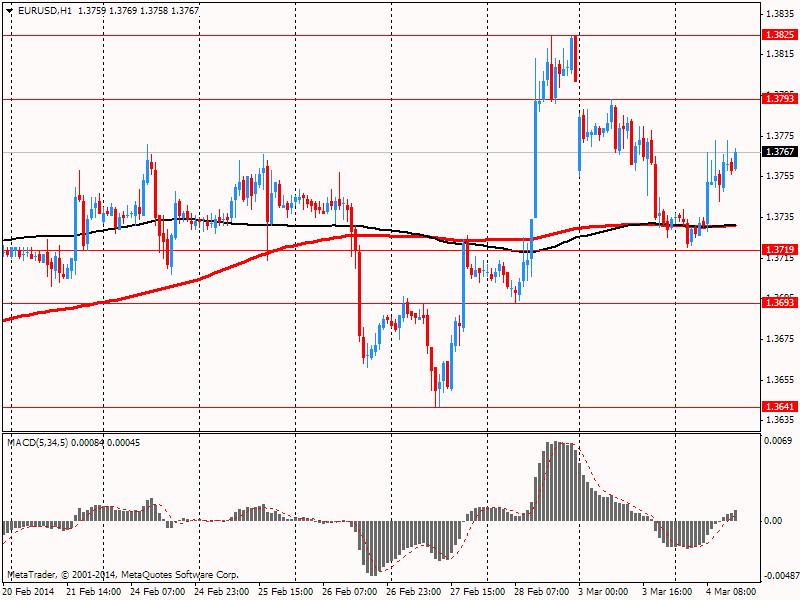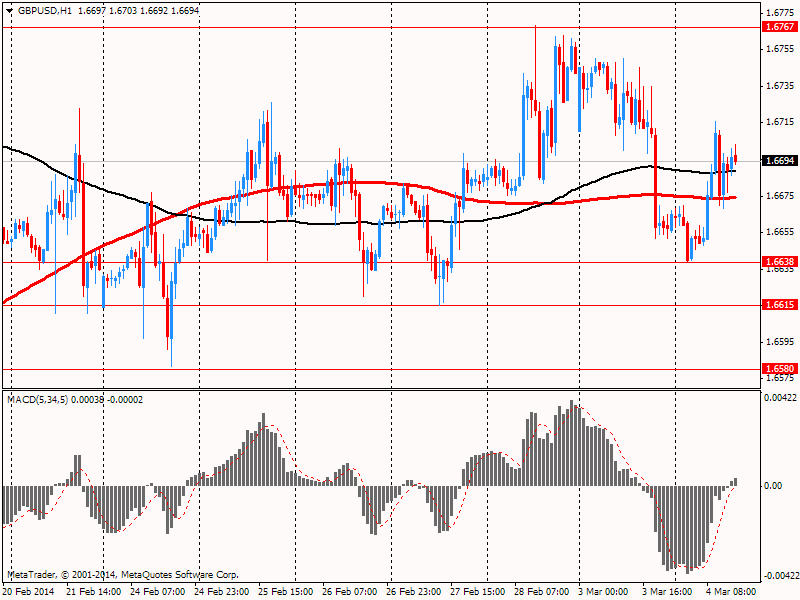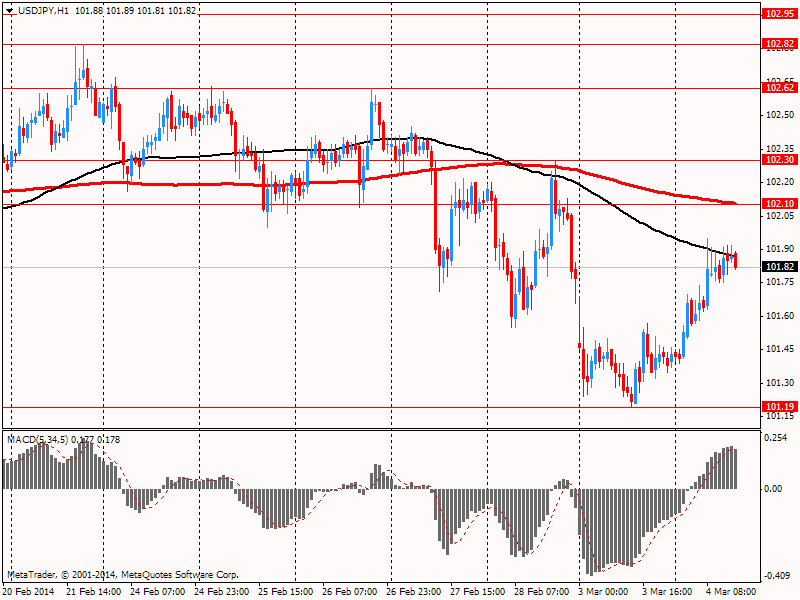Notícias do Mercado
-
23:19
Currencies. Daily history for March 04'2014:
(pare/closed(GMT +2)/change, %)EUR/USD $1,3741 -0,68%
GBP/USD $1,6663 -0,61%
USD/CHF Chf0,8871 +1,57%
USD/JPY Y102,24 +0,78%
EUR/JPY Y140,43 +0,80%
GBP/JPY Y170,26 +0,72%
AUD/USD $0,8948 +0,15%
NZD/USD $0,8386 +0,19%
USD/CAD C$1,1089 +0,13%
-
22:59
Schedule for today, Wednesday, March 05’2014:
(time / country / index / period / previous value / forecast)
00:30 Australia Gross Domestic Product (QoQ) February +0.6% +0.7%
00:30 Australia Gross Domestic Product (YoY) February +2.3% +2.5%
01:45 China HSBC Services PMI February 50.7
08:00 United Kingdom Halifax house price index February +1.1% +0.6%
08:00 United Kingdom Halifax house price index 3m Y/Y February +7.3%
08:48 France Services PMI (Finally) February 46.9 46.9
08:53 Germany Services PMI (Finally) February 55.4 55.4
08:58 Eurozone Services PMI (Finally) February 51.7 51.7
09:30 United Kingdom Purchasing Manager Index Services February 58.3 58.0
10:00 Eurozone Retail Sales (MoM) January -1.6% +0.9%
10:00 Eurozone Retail Sales (YoY) January -1.0% -0.3%
10:00 Eurozone Household Consumption (QoQ) Quarter IV +0.1%
10:00 Eurozone GDP (QoQ) (Revised) Quarter IV +0.3% +0.3%
10:00 Eurozone GDP (YoY) (Revised) Quarter IV +0.5% +0.5%
13:15 U.S. ADP Employment Report February 175 159
15:00 Canada Bank of Canada Rate 1.00% 1.00%
15:00 Canada BOC Rate Statement
15:00 U.S. ISM Non-Manufacturing February 54.0 53.8
15:30 U.S. Crude Oil Inventories February +0.1
19:00 U.S. Fed's Beige Book March
-
22:28
Australia: AIG Services Index, February 55.2
-
19:20
American focus : the euro retreated from highs
The euro exchange rate against the dollar retreated slightly after previously pair rose to daily highs in early U.S. session . The EUR / USD rose to a maximum of $ 1.3780 on the positive opening of Wall Street , but could not hold the position and retreated to the comfort zone of $ 1.3730 on speculation a small decrease in the rate refi and deposit rates before the ECB meeting on Thursday .
The euro has been associated with easing of tensions around Russia and Ukraine. Recall that today Russian President Putin announced the completion of a series of military exercises in the western part of Russia , and ordered the troops to return to base.
Experts note : growth is also linked to the expectations of the ECB meeting on Thursday and the employment report in the U.S. on Friday . However, before these key events in the euro zone will release GDP figures for the 4th quarter , where the forecast is expected to increase by 0.3%. Improved economic outlook is another argument against further easing by the ECB in the near future. However, economic growth is likely to be fast enough to soon reduce excess capacity , the level of which is overvalued and puts pressure on inflation.
Little impact on the euro was data that showed prices of producers eurozone declined in January, more than expected , which was due to falling energy prices . According to the report , producer prices fell 0.3 percent in January , while offsetting an increase of 0.2 percent, which was recorded in December. Many experts expect that producer prices will remain unchanged. Excluding energy , producer prices rose 0.1 percent after zero change in December. Energy prices fell by 1.4 percent in January , compared with 0.5 per cent increase in the previous month. On an annual basis decline in producer prices accelerated in February to 1.4 percent from 0.8 percent in December . Last change coincided with the estimates of experts.
The yen declined significantly against the U.S. currency , which was associated with comments head Bank of Japan and the President of Russia . Kuroda said that low interest rates in Japan are encouraging investors to use the yen as the base currency for the carry trade . This operation , in which investors borrow low-yielding currencies in buying high-yielding currencies . Head of the Bank of Japan said : It is important to assess whether increased volume of such transactions. In addition to advise the Government of Japan on strategies of public pension funds Takatoshi Ito encouraged the authorities to reduce the country's investment in its own government bonds before accelerate inflation . When the rise in prices closer to the Bank of Japan targetiruemym 2 % per annum, the pension fund will be more difficult to sell Japanese government bonds , according to an expert .
Meanwhile, adding that the Russian president ordered the troops , " located on military exercises " , to return to their base. There was hope that the Crimean conflict is resolved - and the demand for safe haven , which is the yen began to fall. Real possibility of military action is low, but a wave of rumors on this issue stirs market. However, once the situation calms down , will be a new wave of interest in the U.S. dollar, especially given the upcoming employment report .
Pound earlier rose against the U.S. dollar , as a territorial dispute between Ukraine and Russia began to be resolved . Pressure on the currency was presented data that showed that the UK construction sector continued its expansion in February, but sharply slowed its pace of growth in comparison with January , as adverse weather conditions violated activity. This was stated in the report, Markit Economics. According to the index of purchasing managers in the construction sector fell last month to a level of 62.6 points, compared with a 77 - month high in January at around 64.6 points. Many experts expect that this figure will decrease only to 63.6 points. I also add that the index remains above the level of 50.0 points , which separates growth from contraction since last May .
Studies have also found that higher levels of production and new orders led to a further sharp rise in employment and procurement. The number of new jobs has reached three-month high in February. The total purchase price inflation accelerated to a five-month low in January , as the pressure on the "chain" of supplies contributed to the growth of the burden . As a result , the average price charged by subcontractors , increased at a record pace on record .
-
13:45
Option expiries for today's 1400GMT cut
USD/JPY Y101.20/25, Y101.50, Y101.90, Y102.00, Y102.25, Y102.30/35, Y102.90, Y103.00
EUR/USD $1.3700, $1.3750, $1.3855
AUD/USD $0.8800, $0.8860, $0.8875, $0.8900, $0.9100
EUR/GBP stg0.8150, stg0.8200, stg0.8300
USD/CAD Cad1.1025, Cad1.1050, Cad1.1100, Cad1.1200
GBP/USD $1.6650, $1.6700, $1.6750, $1.6800, $1.6860, $1.6900
EUR/CHF Chf1.2130, Chf1.2210, Chf1.2250/60
USD/CHF Chf0.8900
AUD/JPY Y89.50, Y91.50
-
13:17
European session: the euro rose sharply against the U.S. dollar
Data
00:30 Australia Building Permits, m/m January -1.3% Revised From -2.9% +0.7% +6.8%
00:30 Australia Building Permits, y/y January +21.8% +34.6%
00:30 Australia Current Account, bln Quarter IV -12.5 Revised From -12.7 -10.1 -10.1
01:30 Japan Labor Cash Earnings, YoY January +0.5% Revised From +0.8% +0.3% -0.2%
03:30 Australia Announcement of the RBA decision on the discount rate 2.50% 2.50% 2.50%
03:30 Australia RBA Rate Statement
09:30 United Kingdom PMI Construction February 64.6 63.6 62.6
10:00 Eurozone Producer Price Index, MoM January +0.2% 0.0% -0.3%
10:00 Eurozone Producer Price Index (YoY) January -0.8% -1.4% -1.4%
10:30 United Kingdom BOE Deputy Governor for Financial Stability Jon Cunliffe speaks
The euro exchange rate has risen sharply against the U.S. dollar due to the easing of tensions around Russia and Ukraine. Recall that today Russian President Putin announced the completion of a series of military exercises in the western part of Russia , and ordered the troops to return to base.
Experts note : growth is also linked to the expectations of the ECB meeting on Thursday and the employment report in the U.S. on Friday . However, before these key events in the euro zone will release GDP figures for the 4th quarter , where the forecast is expected to increase by 0.3%. Improved economic outlook is another argument against further easing by the ECB in the near future. However, economic growth is likely to be fast enough to soon reduce excess capacity , the level of which is overvalued and puts pressure on inflation.
Little impact on the euro was data that showed prices of producers eurozone declined in January, more than expected , which was due to falling energy prices . According to the report , producer prices fell 0.3 percent in January , while offsetting an increase of 0.2 percent, which was recorded in December. Many experts expect that producer prices will remain unchanged. Excluding energy , producer prices rose 0.1 percent after zero change in December. Energy prices fell by 1.4 percent in January , compared with 0.5 per cent increase in the previous month. On an annual basis , the decline in producer prices accelerated in February, 1.4 per cent from 0.8 per cent in December. Last change coincided with the estimates of experts.
The yen declined significantly against the U.S. currency , which was associated with comments head Bank of Japan and the President of Russia . Kuroda said that low interest rates in Japan are encouraging investors to use the yen as the base currency for the carry trade . This operation , in which investors borrow low-yielding currencies in buying high-yielding currencies . Head of the Bank of Japan said : It is important to assess whether increased volume of such transactions. In addition to advise the Government of Japan on strategies of public pension funds Takatoshi Ito encouraged the authorities to reduce the country's investment in its own government bonds before accelerate inflation . When the rise in prices closer to the Bank of Japan targetiruemym 2 % per annum, the pension fund will be more difficult to sell Japanese government bonds , according to an expert .
Meanwhile, adding that the Russian president ordered the troops , " located on military exercises " , to return to their base. There was hope that the Crimean conflict is resolved - and the demand for safe haven , which is the yen began to fall. Real possibility of military action is low, but a wave of rumors on this issue stirs market. However, once the situation calms down , will be a new wave of interest in the U.S. dollar, especially given the upcoming employment report .
Pound rose slightly against the U.S. dollar , as a territorial dispute between Ukraine and Russia began to be resolved . Pressure on the currency was presented data that showed ritansky construction sector continued its expansion in the month of February, but sharply slowed its pace of growth compared to the month of January , as adverse weather conditions violated activity. This was stated in the report, Markit Economics. According to the index of purchasing managers in the construction sector fell last month to a level of 62.6 points, compared with a 77 -month high in January at around 64.6 points. Many experts expect that this figure will decrease only to 63.6 points. I also add that the index remains above the level of 50.0 points , which separates growth from contraction since last May .
Studies have also found that higher levels of production and new orders led to a further sharp rise in employment and procurement. The number of new jobs has reached three-month high in February.
The total purchase price inflation accelerated to a five-month low in January , as the pressure on the "chain" of supplies contributed to the growth of the burden . As a result , the average price charged by subcontractors , increased at a record pace on record .
EUR / USD: during the European session, the pair rose to $ 1.3774
GBP / USD: during the European session, the pair rose to $ 1.6715 , but then retreated slightly
USD / JPY: during the European session, the pair rose to Y101.95
At 21:30 GMT the United States will become aware of the change in the volume of crude oil according to the API for February. At 22:30 GMT Australia will present the index of activity in the service sector from AiG for February.
-
13:02
Orders
EUR/USD
Offers $1.3894, $1.3850/60, $1.3832, $1.3825, $1.3790/800
Bids $1.3710/00, $1.3694, $1.3659-57, $1.3643, $1.3640
GBP/USD
Offers $1.6823, $1.6795/800, $1.6770/80, $1.6760, $1.6720
Bids $1.6640, $1.6617, $1.6605/00, $1.6585/80
AUD/USD
Offers $0.9045/50, $0.9000, $0.8985/90, $0.8967/69
Bids $0.8880, $0.8850, $0.8800
EUR/GBP
Offers stg0.8333, stg0.8300/05, stg0.8267, stg0.82595
Bids stg0.8225/20, stg0.8190-80, stg0.8157, stg0.8150
EUR/JPY
Offers Y141.50, Y141.29, Y141.00, Y140.80, Y140.50
Bids Y139.60/50, Y139.28, Y139.20, Y139.00, Y138.50
USD/JPY
Offers Y102.90/00, Y102.65/70, Y102.45/50, Y102.29, Y102.00
Bids Y101.20, Y101.00, Y100.75/61, Y100.50, Y100.00
-
10:20
Option expiries for today's 1400GMT cut
USD/JPY Y101.20/25, Y101.50, Y101.90, Y102.00, Y102.25, Y102.30/35, Y102.90, Y103.00
EUR/USD $1.3700, $1.3750, $1.3855
AUD/USD $0.8800, $0.8860, $0.8875, $0.8900, $0.9100
EUR/GBP stg0.8150, stg0.8200, stg0.8300
USD/CAD Cad1.1025, Cad1.1050, Cad1.1100, Cad1.1200
GBP/USD $1.6650, $1.6700, $1.6750, $1.6800, $1.6860, $1.6900
EUR/CHF Chf1.2130, Chf1.2210, Chf1.2250/60
USD/CHF Chf0.8900
AUD/JPY Y89.50, Y91.50
-
10:00
Eurozone: Producer Price Index, MoM , January -0.3% (forecast 0.0%)
-
10:00
Eurozone: Producer Price Index (YoY), January -1.4% (forecast -1.4%)
-
09:30
United Kingdom: PMI Construction, February 62.6 (forecast 63.6)
-
06:21
Asian session: The yen weakened
00:30 Australia Building Permits, m/m January -1.3% Revised From -2.9% +0.7% +6.8%
00:30 Australia Building Permits, y/y January +21.8% +34.6%
00:30 Australia Current Account, bln Quarter IV -12.5 Revised From -12.7 -10.1 -10.1
01:30 Japan Labor Cash Earnings, YoY January +0.5% Revised From +0.8% +0.3% -0.2%
03:30 Australia Announcement of the RBA decision on the discount rate 2.50% 2.50% 2.50%
03:30 Australia RBA Rate Statement
The yen weakened against most of its 16 major peers after Bank of Japan Governor Haruhiko Kuroda said there’s momentum for carry trade. There is momentum spurring the yen carry trade, Kuroda said in parliament today, referring to a strategy of borrowing in a low-rate market to fund purchases of higher-yielding assets. The BOJ currently buys about 7 trillion yen ($69 billion) of Japan’s government bonds every month to boost inflation to its 2 percent target through lower borrowing costs.
The yen reached a one-month high yesterday as Russia took control of Ukraine’s Crimea region, spurring demand for safer assets.
Australia’s dollar weakened today after the Reserve Bank left its benchmark interest rate unchanged at a record low to spur domestic industries and offset a slump in mining investment. “The decline in the exchange rate seen to date will assist in achieving balanced growth in the economy, though the exchange rate remains high by historical standards,” RBA Governor Glenn Stevens said in a statement accompanying the decision. He last month refrained from language pointing to the currency trading at a high level.
EUR / USD: during the Asian session, the pair traded in the range of $ 1.3720-40
GBP / USD: during the Asian session the pair fell to $ 1.6640
USD / JPY: during the Asian session, the pair rose to Y101.75
The Ukrainian crisis will continue to dominate headlines on Tuesday, although markets will have a full data calendar to concentrate on, albeit mainly second tier releases. The European calendar gets underway at 0700GMT, with the release of the German fourth quarter wholesale sales data. There is a flurry of monthly car sales data expected throughout the day. At 0800GMT, French February car sales data will be released. German car registration data is also due at some point in the morning session. At 0900GMT, Spanish February net unemployment data will be released, with analysts looking for an increase of 22,000. The German January VDMA machine orders data will be published at the same time. At 1000GMT, EMU January PPI data will be published, seen down 0.1% on month, down 1.3% on year. There is only limited UK data expected, with the February CIPS/Markit Construction PMI data set to cross the wires. Across the Atlantic, the US calendar will kick off with the release of the February Domestic Vehicle Sales. The ICSC-Goldman Store Sales data for the Mar 1 week will be released at 1245GMT, with the Redbook Average for the same period due at 1355GMT. At 1445GMT, the February ISM-NY Business Index will be published, followed at 1500GMT by the release of the March IBD/TIPP Optimism Index. Also at 1500GMT, the Senate Banking Committee had planned to hold confirmation hearings for the Obama Administration's latest Fed appointments, but these have been postponed due to the weather. There is no reserve date yet in place. The White House will release the fiscal year 2014 budget at 1745GMT. There is little in the way of scheduled central bank speak, although Richmond Federal Reserve Bank President Jeffrey Lacker will deliver a speech in New York at 2115GMT.
-
03:30
Australia: Announcement of the RBA decision on the discount rate, 2.50% (forecast 2.50%)
-
01:31
Japan: Labor Cash Earnings, YoY, January -0.2% (forecast +0.3%)
-
00:41
Australia: Current Account, bln, Quarter IV -10.1 (forecast -10.1)
-
00:31
Australia: Current Account, bln, Quarter IV +10.1 (forecast -10.1)
-
00:31
Australia: Building Permits, y/y, January +34.6%
-
00:30
Australia: Building Permits, m/m, January +6.8% (forecast +0.7%)
-


